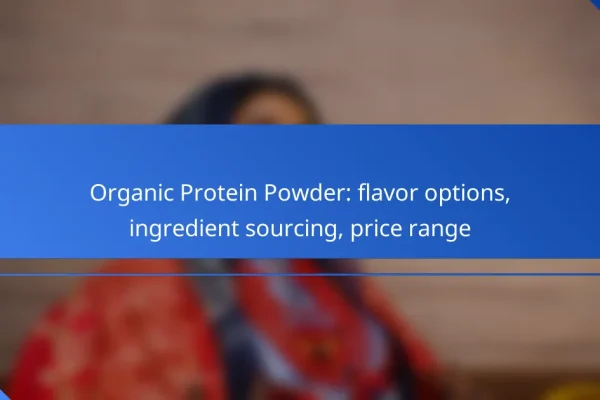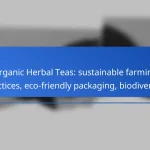How to Choose Organic Products for Your Family
Choosing organic products for your family involves understanding certifications, ingredient transparency, and sourcing. Prioritize items that meet recognized organic standards to ensure quality and safety.
Consider certifications like USDA Organic
Look for products that display the USDA Organic seal, which indicates they meet strict federal guidelines for organic farming and processing. This certification ensures that the product is free from synthetic fertilizers, pesticides, and genetically modified organisms (GMOs).
Other certifications, such as Non-GMO Project Verified or Certified Organic by other reputable organizations, can also provide assurance of a product’s organic integrity. Familiarize yourself with these labels to make informed choices.
Evaluate ingredient transparency
Check the ingredient list for clarity and comprehensiveness. Organic products should have minimal ingredients, all of which should be recognizable and ideally sourced from organic farms.
Avoid products with long lists of additives or vague terms like “natural flavors.” Transparency in ingredient sourcing can help you assess the product’s quality and nutritional value.
Assess product sourcing and local availability
Consider where the organic products are sourced from, as local options may be fresher and more sustainable. Supporting local farmers can also reduce your carbon footprint.
Visit farmers’ markets or local co-ops to find organic products that are grown nearby. This not only ensures quality but also fosters community support and may offer better prices compared to large retailers.
What are the benefits of using organic products?
Using organic products offers several advantages, including reduced exposure to harmful chemicals, improved nutritional content, and a positive impact on the environment. These benefits make organic options appealing for health-conscious consumers and those concerned about sustainability.
Reduced exposure to pesticides
Organic products are grown without synthetic pesticides, which can be harmful to human health and the environment. By choosing organic, consumers significantly lower their risk of pesticide exposure, which is particularly important for vulnerable populations such as children and pregnant women.
In the United States, the USDA regulates organic farming practices, ensuring that products labeled as organic meet specific standards. This includes restrictions on the types of pesticides that can be used, promoting safer farming methods.
Higher nutritional value
Research suggests that organic products may have higher nutritional value compared to their conventional counterparts. They often contain more antioxidants, vitamins, and minerals, which can contribute to better overall health.
For instance, organic fruits and vegetables are typically fresher, as they are grown without preservatives that extend shelf life. This freshness can lead to better taste and enhanced nutritional profiles, making them a worthwhile investment for health-focused consumers.
Environmental sustainability
Organic farming practices promote environmental sustainability by enhancing soil health, conserving water, and reducing pollution. These methods often include crop rotation, composting, and reduced reliance on fossil fuels, which collectively contribute to a healthier ecosystem.
Choosing organic products supports agricultural practices that are less harmful to wildlife and biodiversity. By reducing chemical runoff and promoting natural farming techniques, consumers can play a role in preserving the environment for future generations.
Which organic brands are trusted in the market?
Several organic brands have established a reputation for quality and trustworthiness among consumers. Brands like Whole Foods Market 365, Organic Valley, and Nature’s Path are recognized for their commitment to organic standards and sustainable practices.
Whole Foods Market 365
Whole Foods Market 365 offers a range of organic products at competitive prices, making it accessible for budget-conscious shoppers. Their private label products are often certified organic and provide a reliable option for those seeking quality without breaking the bank.
When choosing Whole Foods Market 365 products, look for the USDA Organic seal to ensure compliance with organic farming standards. This brand is particularly popular for its fresh produce, dairy, and pantry staples.
Organic Valley
Organic Valley is a cooperative of farmers dedicated to producing organic dairy, eggs, and produce. This brand is well-regarded for its commitment to animal welfare and sustainable farming practices, ensuring high-quality products that are free from synthetic additives.
Consumers often appreciate Organic Valley’s transparency regarding sourcing and production methods. Their products, such as milk and cheese, are widely available in grocery stores across the U.S. and are often priced slightly higher due to their premium quality.
Nature’s Path
Nature’s Path specializes in organic cereals, granola bars, and snacks, focusing on environmentally sustainable practices. This brand is known for its commitment to non-GMO ingredients and offers a variety of gluten-free options, catering to diverse dietary needs.
When selecting Nature’s Path products, check for certifications like USDA Organic and Non-GMO Project Verified. Their products are widely available in health food stores and supermarkets, making them a convenient choice for health-conscious consumers.
How to identify quality organic products?
To identify quality organic products, look for certifications, clear labeling, and brand reputation. These factors help ensure that the products meet organic standards and are safe for consumption.
Check for third-party testing
Third-party testing verifies that organic products meet specific safety and quality standards. Look for products that display certifications from recognized organizations, such as the USDA Organic label in the United States or the EU Organic logo in Europe.
These certifications indicate that the product has undergone rigorous testing for pesticides, herbicides, and other contaminants. Avoid products without such certifications, as they may not adhere to organic farming practices.
Look for clear labeling
Clear labeling is essential for understanding what you are purchasing. Quality organic products should have labels that specify the ingredients, the percentage of organic content, and any relevant certifications.
Be cautious of vague terms like “natural” or “made with organic ingredients,” as these may not guarantee the same standards as certified organic products. Always prioritize items with transparent and detailed labeling.
Research brand reputation
Brand reputation plays a significant role in identifying quality organic products. Investigate the brand’s history, customer reviews, and any controversies related to their practices.
Brands with a strong commitment to organic farming and sustainability often have positive feedback from consumers. Look for brands that are transparent about their sourcing and production processes to ensure you are making an informed choice.
What are the common misconceptions about organic products?
Many people hold misconceptions about organic products that can lead to confusion when making purchasing decisions. Understanding these misconceptions can help consumers make informed choices about what they buy.
Organic means no chemicals
A common belief is that organic products are entirely free of chemicals. In reality, organic farming does use certain approved substances, including natural pesticides and fertilizers, to manage pests and enhance soil health. These chemicals are typically derived from natural sources and are regulated by standards set by organizations like the USDA.
It’s essential to recognize that “chemical” does not inherently mean harmful; many substances, including water and salt, are chemicals. The focus in organic farming is on using substances that are less harmful to the environment and human health.
Organic is always more expensive
While organic products often come with a higher price tag due to more labor-intensive farming practices, this is not universally true. Prices can vary significantly based on factors such as location, seasonality, and supply chain dynamics. In some cases, local farmers’ markets may offer organic options at competitive prices.
Consumers can save money by buying organic items in bulk or choosing store brands. Additionally, shopping during sales or using coupons can help offset the costs associated with organic products.
All organic products are healthier
Not all organic products are necessarily healthier than their conventional counterparts. While organic fruits and vegetables are often grown without synthetic pesticides, they can still be high in sugar or calories, similar to non-organic options. It’s crucial to evaluate the nutritional content of each product rather than relying solely on the organic label.
Furthermore, some processed organic foods may contain additives or preservatives that are not present in their non-organic versions. Always check ingredient lists and nutritional information to make the healthiest choice.
How do organic products impact health?
Organic products can positively influence health by reducing exposure to harmful chemicals and promoting a diet rich in nutrients. They often contain higher levels of antioxidants and beneficial compounds, which can contribute to overall wellness.
Lower risk of chronic diseases
Consuming organic products may lower the risk of chronic diseases such as heart disease, diabetes, and certain cancers. This is largely due to the absence of synthetic pesticides and fertilizers, which can have adverse health effects over time.
Research suggests that organic diets can lead to improved cardiovascular health and lower inflammation levels. Choosing organic fruits, vegetables, and whole grains can be a proactive step towards reducing these health risks.
Improved gut health
Organic products often contain more fiber and beneficial bacteria, which are essential for maintaining a healthy gut microbiome. A diverse and balanced gut flora can enhance digestion and boost the immune system.
Incorporating organic yogurt, fermented foods, and high-fiber organic fruits and vegetables can support gut health. Avoiding processed foods and additives found in non-organic options can further benefit digestive well-being.
Better overall well-being
Choosing organic products can lead to better overall well-being by promoting a healthier lifestyle. Many people report feeling more energetic and mentally clear when consuming organic foods, likely due to their higher nutrient content.
Additionally, organic farming practices are often more sustainable, contributing to environmental health. This connection to a healthier planet can enhance personal well-being and foster a sense of community responsibility.










